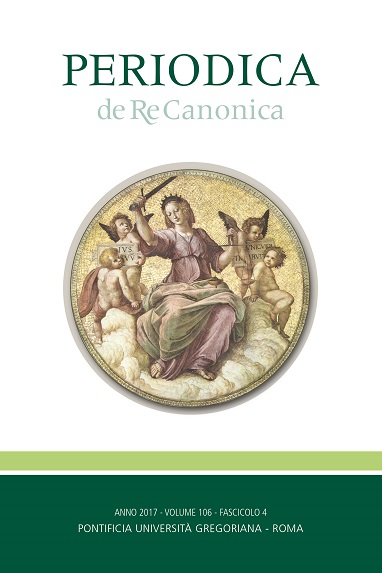Volume 112 - Issue 2
- Home
- Research and Publications
- Periodicals
- Periodica de Re Canonica
- Issues
- 2023
- Volume 112 - Issue 2

PERIODICA RE CANONICA - FIRST ISSUE 2023
Issue 112/2 (2023) of the magazine Periodica de re canonica, quarterly published by the Faculty of Canon Law of the Pontifical Gregorian University, is now available.
Gianfranco Ghirlanda, S.J., In Ecclesiarum communione: The Reorganization of the Vicariate of the Diocese of Rome, 175-202
Abstract: The author shows how the reform of the Roman Curia is a symbol for the reorganization of the Vicariate of the diocese of Rome, which took place with the apostolic constitution In Ecclesiarum communione, which in turn must be a symbol for the reorganization of the various diocesan curiae. The Church of Rome is presented as an evangelizing and missionary community, which must organize itself on the basis of the principle of synodality and participation. This becomes concrete in the importance that the apostolic constitution gives to the episcopal council, presided over by Pope himself or, in his absence, by the Cardinal Vicar, and composed of all the auxiliary bishops, who are called upon not only to express their own respective opinions but, beyond can. 473 §4, to give consent to the decisions of the Cardinal Vicar in the most important matters that are determined in the apostolic constitution itself. It is in fact considered the “primary organ of synodality” and the “highest place of discernment and of pastoral and administrative decisions”. In the spirit of synodality, in a consultative manner, all of the diocesan consultative bodies must also be involved in the most important decisions by the episcopal council.
Keywords: Cardinal Vicar; vicar general; episcopal vicar; episcopal council; diocesan curia; Vicariate of Rome.
Jordi Bertomeu Farnós, The right of defense and procedural professional assistance: the new art. 20 §7 of the Norms for delicta reservata, 203-231
Abstract: The recent reform of the Normae or motu proprio Sacramentorum sanctitatis tutela has required (in art. 20 §7) an obligatory and professional defense, even with the presence of advocates ex officio, in trials concerning delicta graviora that are undertaken under the competency of the Dicastery for the Doctrine of the Faith as a fitting manifestation of the right of defense in inflicting or declaring a penalty by means of an extrajudicial decree. This legislative choice, taken within the context of a progressive “judicialization” of the administrative penal procedure, involves an implicit confusion of the right to defense with procedural professional assistance, a confusion that not only makes the right to self-defense almost impossible (a right that is implicitly permitted in the CIC and is fully consolidated in the jurisprudence of the various international courts that are comparable to the DDF) but also raises many perplexities and problems that are contrary to the presumed interests of justice that support such a decision.
Keywords: delicta graviora; right of defense; procedural professional assistance; advocate ex officio.
Conor Steadman, Moral Certitude and the Australian Royal Commission, 233-265
Abstract: This article traces the dialogue between Australian authorities, the Australian Episcopal Conference, and the Holy See concerning the response to the crisis of the sexual abuse of minors, focusing solely on the question of the certainty required for the resolution of criminal cases. On the part of the Church, the insufficiency of “probability” (the “balance of probabilities”) for a conviction in the canonical forum in the face of the requirement for moral certainty (can. 1608), is confirmed.
Keywords: Royal Commission of Australia; Royal Commission into Institutional Child Sexual Abuse; Final Report; Recommendations; canonical penal cases; balance of probabilities; moral certitude.
Francesco Coccopalmerio, The Dicastery for Legislative Texts (Dicastery for Canon Law?) in the Apostolic Constitution Praedicate evangelium, 267-297
Abstract: The author intends to present the Dicastery for Legislative Texts as it is structured in the apostolic constitution Praedicate evangelium in Articles 175-182. First, he offers a thorough analysis of the aforementioned articles, considering the previous configuration of the Pontifical Council for Legislative Texts in Pastor bonus. He then rereads the articles themselves in a different order, an approach that allows the author to understand more clearly the tasks proper to the Dicastery. In the end, he attempts an evaluation of the Dicastery for Legislative Texts also through an analogy with the Dicastery for the Doctrine of the Faith.
Keywords: current canonical legislation; tasks of specific competence of the Dicastery for Legislative Texts; study, supervision, teaching of the current canonical legislation; continuous monitoring for update; collaboration of canonists and promotion of associations; law as an ontological reality; juridical attributions of the person as an ontological reality.
Paolo Bianchi, From the Preliminary Investigation to the Penal Process: What Should be Obtained?, 299-317
Paweł Malecha, Does the Apostolic Constitution Praedicate evangelium Bring About Any Changes regarding Advocates Involved with the Roman Curia and the Advocates of the Holy See?, 319-326
Romanae Rotae Tribunal, Decretum coram R.P.D. Gerardo McKay, R.P.D. Michaële Xaverio Leone Arokiaraj, Extensore, diei 2 decembris 2016, in una Poenalis; Praeiud.: Null. Decisionum (B. 101/2016), 327-336
Marco Billeri, Conflicts between Private Associations of the Faithful and Ecclesiastical Authority. A Study on the Tension Between Autonomy and Legitimate Vigilance, 337-347